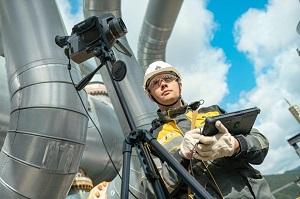Rosneft Scales Up Methane Emission Control Technologies in Refining and Petrochemistry

Rosneft launched a project to adapt technologies to control fugitive emissions of methane and other hydrocarbons and improve industrial safety at production facilities of its refineries. This year, surveys were conducted at Angarsk Petrochemical Company, Novokuibyshevsk Petrochemical Company and Novokuibyshevsk Oils and Additives Plant. The aim of the project is to assess the potential for scaling up the programme, initially to refineries and petrochemical companies, and, in the future, to the whole value chain.
Over the past three years, the Company has successfully implemented a comprehensive programme to detect and eliminate fugitive methane emissions sources at its production sites. This year the programme will be implemented in 24 of the Company’s subsidiaries. During the first half of the year, 710 objects were surveyed at the enterprises’ production sites using ground monitoring equipment. In addition, unmanned aerial vehicles were used to monitor 13 of the Company’s subsidiaries and a total of 161 assets, including 2.4 thousand kilometres of pipelines, were surveyed.
The year also saw the first surveys of facilities at the Sakhalin-1 project, including the Odoptu and Chaivo onshore oil and gas processing complexes and the Berkut offshore fixed platform.
As part of the Rosneft 2030 Strategy, the Company has set the goal of achieving carbon neutrality (in terms of Scope 1 and 2 greenhouse gas emissions) — by 2050. The strategy also formulates medium-term horizons for the climate agenda, which include reducing methane emission intensity to less than 0.2% by 2030.
In parallel with the expansion of the methane emissions control programme at infrastructure facilities, the Company is developing and implementing a methodological framework to identify and address fugitive sources of methane and other volatile hydrocarbon emissions, taking into account best international practices.
The Company uses best national and global practices, scientific developments and modern technological solutions to reduce greenhouse gas emissions, including methane, and maintain the integrity of the production infrastructure. Developing and scaling best practice approaches will improve the efficiency of methane emission reductions and the safety of operations along the value chain.
Rosneft
Information and Advertising Department
October 25, 2023